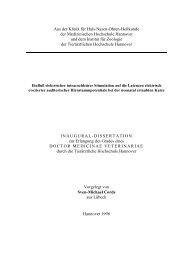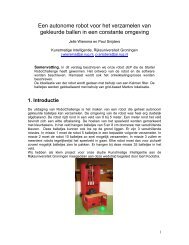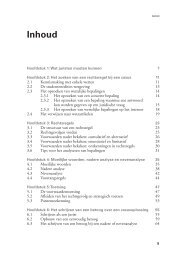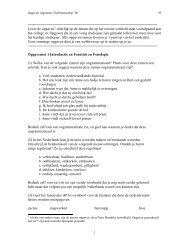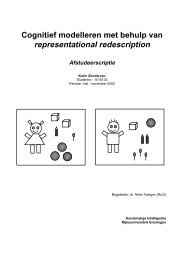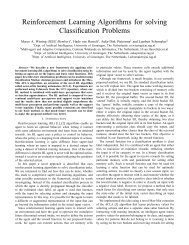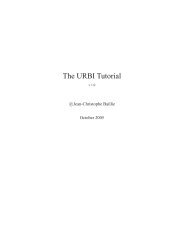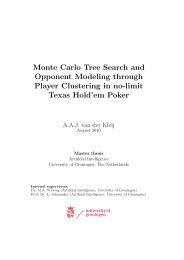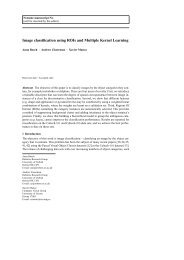Presuppositions in Spoken Discourse
Presuppositions in Spoken Discourse
Presuppositions in Spoken Discourse
Create successful ePaper yourself
Turn your PDF publications into a flip-book with our unique Google optimized e-Paper software.
Chapter 2<br />
(49) a. Julia doesn’t have a bicycle. If Julia had more money, her bicycle would<br />
be red.<br />
30<br />
b. [1 x : Julia(x), ¬[2 y : bicycle(y), x owns y], [3 z : x had money ] ⇒ [4 z : [<br />
bicycle (z), z = ?, x owns z ], red(z) ]<br />
c. [1x : Julia(x), ¬[2 y : bicycle(y), x owns y], [3 z : x had money, bicycle (z),<br />
x owns z ] ⇒ [4 : red(z) ]<br />
d. [1x : Julia(x), ¬[2 y : bicycle(y), x owns y], [3 : x had money ] ⇒ [4 z :<br />
bicycle (z) , red(z), x owns z ]<br />
In this example, there is no accessible reference marker for a bicycle that the<br />
<strong>in</strong>duced presupposition can b<strong>in</strong>d with. Because b<strong>in</strong>d<strong>in</strong>g is not possible, we have to<br />
accommodate. In the example above, the presupposition occurs <strong>in</strong> the consequent<br />
of a conditional, which means that three levels of accommodation are possible<br />
because there are three structural positions that are accessible, e.g. at (49)b 1, (49)b 2<br />
or (49) b 3. Global accommodation would add the presupposed <strong>in</strong>formation to the<br />
ma<strong>in</strong> DRS 1. This is what we try first. But accommodation <strong>in</strong> the ma<strong>in</strong> DRS, DRS 1,<br />
would make the discourse <strong>in</strong>consistent. The discourse would read, “Julia has a<br />
bicycle. Julia doesn’t have a bicycle. If she had more money, it would be red.” This<br />
is not a well-formed discourse. Instead we have to try to accommodate <strong>in</strong> the next<br />
highest level of embedd<strong>in</strong>g accessible from the home DRS of the trigger. This is<br />
the antecedent of the conditional. If the presupposed <strong>in</strong>formation is<br />
accommodated here then the discourse reads “Julia doesn’t have a bicycle. If Julia<br />
had more money and had a bicycle, then her bicycle would be red.” This is not<br />
<strong>in</strong>consistent, and the discourse is well-formed. Accommodation can therefore add<br />
the presupposed <strong>in</strong>formation to the antecedent of the conditional. Because this is<br />
between the home DRS and the ma<strong>in</strong> DRS it is called <strong>in</strong>termediate accommodation. It is<br />
also possible to accommodate the presupposition <strong>in</strong> the home DRS where the<br />
presupposition was triggered, i.e. <strong>in</strong> the consequent of the conditional. The result,<br />
represented <strong>in</strong> (49)d, would mean someth<strong>in</strong>g like “Julia doesn’t have a bicycle. If<br />
she had more money, she would have a bicycle and it would be red.” This is called<br />
local accommodation. This is also consistent and <strong>in</strong>formative with respect to the<br />
discourse, and we would consider the discourse above ambiguous between the two<br />
read<strong>in</strong>gs. Now consider another example of local accommodation.<br />
(50) Because John is a bachelor, his wife isn’t com<strong>in</strong>g to the party with him.<br />
John doesn’t have a wife. However, the possessive NP, his wife triggers the<br />
presupposition that John does have a wife. This <strong>in</strong>formation contradicts the<br />
<strong>in</strong>formation <strong>in</strong> the first conjunct of the sentence. Therefore, the <strong>in</strong>duced<br />
presupposition cannot be accommodated <strong>in</strong> the ma<strong>in</strong> context, and we have to try<br />
accommodation at the next lowest DRS on the accessibility path between the ma<strong>in</strong><br />
context and the home DRS. This is the home DRS, embedded under negation. We<br />
can accommodate here and the mean<strong>in</strong>g we then get is someth<strong>in</strong>g like “Because



